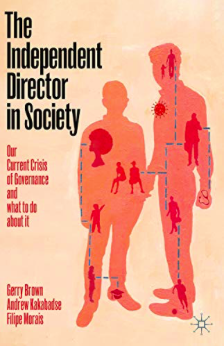Sport’s governance problem: Scandal beckons without more professionalism and transparency

As recent headlines attest, serious problems of governance can be found all across the sports sector.
Gathering extensive empirical research for our new book on the role of independent directors, we found problems with a lack of accountability, unclear governance and a lack of skills and experience to sort out the mess.
We consulted directors from National Governing Bodies and County Sports Partnerships. We also interviewed key executives from British Rowing, Sports Aid, the Football Association, British Horseracing Authority, Lawn Tennis Association, football clubs including Celtic and Southampton, UK Athletics, the International Cricket Council and Sport England.
The survey results in this sector make for grim reading.
Far too many directors and trustees responded to our questions by saying “don’t know”. It isn’t promising that – when assured of full confidentiality and anonymized reporting – this is the commonest response coming from our sports boardrooms.
Some interviewees say this “not knowing” is because of a confusion over the nature and purpose of sporting organisations. At times they can be called upon to act like a business, but many, especially the smaller ones, are organised as charities.
Some spoke of a lack of diversity, and of boards recruiting directors “who they think will give them a less challenging time”.
Some people become directors of sporting organisations because they are passionate about the sport, but that too can compromise independence. “If you’re a fan of the sport, you really need to be able to separate yourself from that in order to provide check and challenge,” said one interviewee.
Poor engagement and little strategy
Engagement levels are often poor. Ninety-two per cent said they had board meetings six times a year or fewer, and 73 per cent reported meetings lasting four hours or fewer. Forty-six per cent devoted less than 10 days a year to their role as independent director.
Nineteen per cent reported that their board does not have a “strategy day”, leaving an open question as to how strategy is made in these boards—is there a formal strategy at all? —and outside experts are rarely invited to board meetings to give advice.
Ten per cent of chief executives were reported to have little dialogue with their boards, meaning communication between boards and executive teams in such cases is low, and 14 per cent reported that they do not get enough information to assess performance or make effective decisions.

What makes this worse is that there is clear evidence of a lack of experience for the role, and of trustees and directors being appointed on an ad hoc basis.
Sixty-two per cent of respondents had less than three years’ experience in their role, and half had no other similar board position, meaning their experience is limited in the extreme.
Only 26 per cent were selected through a formal process conducted by a nominations committee, and 68 per cent did not think the process of recruitment was extensive. More than 10 per cent had no induction training.
The key challenges
There are many challenges in sports governance, key amongst those arising from our in-depth research are:
• Lack of resources
• Dependence on lottery/public funding
• Competition for declining resources
• Lack of accountability
• Unclear governance at lower levels in sport
• Lack of appropriate skills and competencies
• Rebuilding grassroots sports and sports participation in particular after the coronavirus pandemic
What emerges overall from our survey, which was carried out with Henley Business School, is a picture of inexperienced and untrained directors making decisions based on inadequate information, without enough discussion or debate to explore the issues thoroughly.
Urgent action required to save clubs
Without effective governance, the door is open for scandals to continue to happen.
Sport organisation needs to become more professionally managed and, especially, more transparent and better governed if they are to attract more people to participate in sports as well as avoid further scandals.
This also needs to apply with some urgency if many of our local sports clubs – whether professional, amateur or community – are to even have a future in these difficult coronavirus times.
An understanding of the nature of these specific challenges and the skill and experience to deal with them are among the things the board level management of every sports club needs.
Gerry Brown, Andrew Kakabadse and Filipe Morais are the authors of The Independent Director in Society: Our Current Crisis of Governance & What To Do About It published by Palgrave Macmillan.